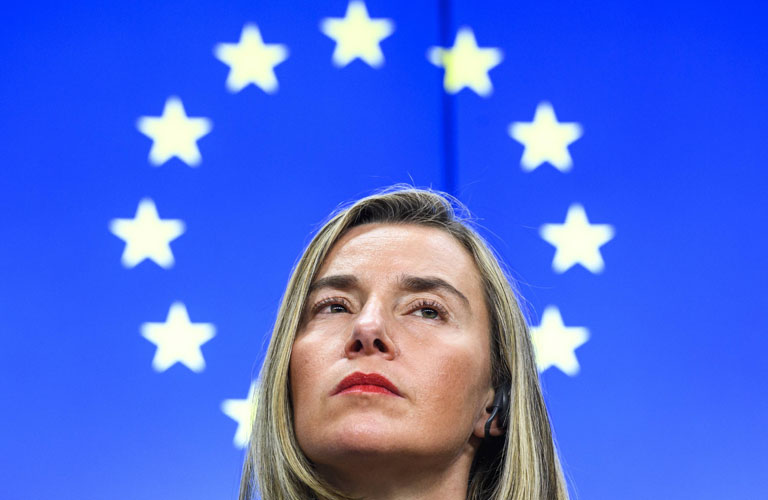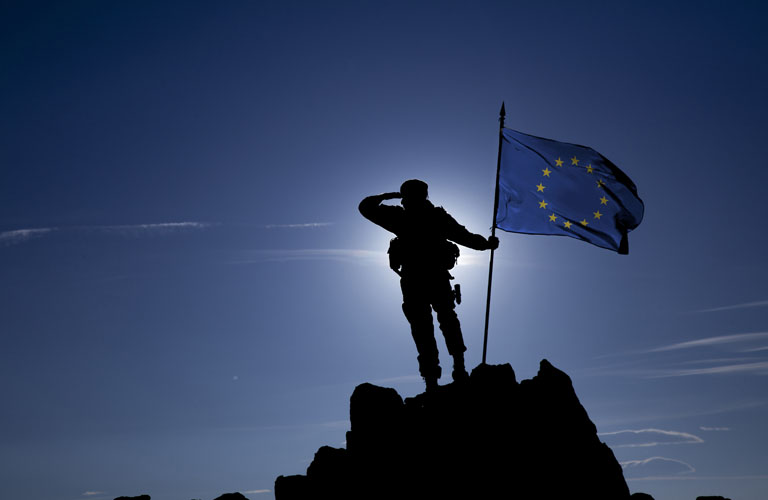The West and the search for its future
There was a time when it appeared that history was coming to an end and the future was set to begin. The democratic and capitalist West had brought communism and the command economies of the East to their knees, not least by dint of an arms race the Soviet Union ultimately couldn’t keep up with. The battle of the two systems had a clear winner and the era of the Cold War seemed finally to have come to an end. At the time, even the question was occasionally broached as to whether the North Atlantic Treaty Organization (NATO) was still necessary now that the USSR and the Eastern bloc had dissolved.
Other options would have been for the Atlantic alliance to integrate Russia militarily and work toward a giant common free trade area and a “harmonious economic community stretching from Lisbon to Vladivostok,” as imagined by Russia’s Vladimir Putin, as well as the creation of a “unified continental market.” The world seemed ready to become One World.
Anything was possible: Confrontation would give way to cooperation, democracy and peace.
That was then. This is now. For the United States, the Russian Federation has once again become what the Soviet Union had been: the enemy. After the dissolution of the USSR, Moscow was no longer considered to be on equal footing, so NATO, led by the US, used the opportunity to expand its sphere of influence eastward. For its part, the EU, too, took what fell into its lap.
Moscow’s pent-up anger was vented at the Munich Security Conference (MSC) in 2007, when Putin fulminated over America’s concept of a “unipolar world” and the “uncontained hyper-use of military force” by NATO, which had “overstepped its national borders in every way.” NATO and the EU, he argued, imposed their will upon other countries while advancing their military infrastructure “to our borders.” Putin would no longer tolerate being patronized and pushed around as a mere “regional power,” as President Barack Obama called Russia in March 2014. The Russian president ultimately annexed Crimea and supported the separatists in Eastern Ukraine. Today, once again, NATO faces an enemy on its eastern flank.
This frightens the Eastern Europeans. Having just escaped communism, they embraced the West, only to soon realize that unquestioning emulation did not yield all the expected results. Resistance to the zeitgeist of globalization grew, and more and more Eastern Europeans increasingly felt that the capitalist system failed to deliver them their fair share.
In other words, the beacon of the future – Western democracy and modernization – lost its credibility. In the book he co-authored with Stephan Holmes, The Light that Failed, the Bulgarian political theorist Ivan Krastev wrote in somber tones of the “twilight of Europe” (see Krastev’s piece on page 29).
Africa’s Krastev, the Senegalese scholar and writer Felwine Sarr, has his own doubts about Western hegemony. He does not wish to further “universalize” the Western values system African elites have fallen for. He “refuses to legitimize the rat race” and wants to liberate the black continent “from all that degrades the people and extinguishes their power and creativity.” He seeks to “deliver them fully from the monstrous structures of a relentless global economic order.” He wants to shed what Africa has adopted from the Europeans; he strives for autonomy and toward an “Afrotopia.”
In addition to our liberal society, the trans-Atlantic defense alliance is once again up for discussion, but for reasons that differ from those in 1990. Even a German historian has questioned whether we still really need NATO and the EU. Gregor Schöllgen would like to dissolve these two “anachronistic monsters”; as far as he’s concerned, they are mere “reminders of a closed chapter in world politics.” As Schöllgen lays out in essays published in the Frankfurter Allgemeine Zeitung and The German Times, we need a new beginning.
But why? Because the EU and NATO no longer function as they once did. They are failing to find common solutions to the problems of our time. On the issue of asylum for refugees, most EU countries have shown a frightening degree of egotism, while climate change fuels fierce debates. The Brits are leaving the EU, while the US president has pronounced NATO “obsolete.”
Ever since this verdict, a certain specter has haunted the security policy debate. Could the US actually leave the Alliance and take all its weapons with it, including their nuclear missiles? One year ago, Congress put to rest any such considerations with its NATO Support Act, which passed the House of Representatives 357 to 22 and cleared the Senate by a margin of 97 to 2. Also, at the top of this year’s agenda is Defender Europe 20, the largest exercise contingent of American soldiers to leave the US for Europe since the mid-1990s.
But what if the US were to leave Europe?
Could Europe defend itself? Even if Russia’s defense spending is equal only to that of France, Moscow’s mid-range missiles are capable of reaching the heart of Europe. Would all European NATO members honor the mutual defense clause to, say, protect the Baltic states from Russian aggression?
Such considerations in the Baltics and even in Poland would cause teeth-chattering. While majorities in these regions are critical of the EU, the idea of spurning NATO or doubting the value of its existence is viewed as nonsense.
NATO’s greatest troubles appear to be homemade. Turkish President Recep Tayyip Erdoğan has ordered missile defense systems from Moscow, asserted Turkey’s right to possess atomic weapons and invaded Syria in violation of international law. And Europe is sorely lacking a reliable partner in the White House.
When the US makes a decision, the Europeans – often gritting their teeth – have no choice but to comply. Former Assistant US Secretary of State Victoria Nuland gave expression to this state of affairs in a leaked telephone conversation with a colleague in 2014: “Fuck the EU.” Obama’s successor pulled out of the INF Treaty, which prohibited the stationing of mid-range nuclear missiles in Europe, while the last remaining disarmament treaty from the 20th century, New START, is now in peril. Trump terminated the nuclear deal with Iran and, without any consultation with allies, announced a retreat from Syria, which gave Erdoğan the green light to launch his offensive from the north.
Who will cover the costs of the new arms race? Who will pick up the pieces in Iran and Ukraine? And who will help the Kurds, who may soon again end up in the torture chambers of Assad?
The crises of NATO and the EU are simmering as the more than 500 experts from the worlds of politics, science and the military convene in mid-February at the Hotel Bayerischer Hof in Munich for the 56th Munich Security Conference. China’s ambitious expansion will also be a topic, and Russia even more so. Should the Western world show Putin the carrot or the stick?
The MSC will also address the issue of terrorism; indeed, French President Macron is seeking reinforcements for the fight against Islamist insurgents in Mali.
Germany’s defense budget will certainly be a topic. A “country of our size and our economic and technological might” can defend its own “global interests,” instead of “simply spectating from the sidelines,” says a convinced Annegret Kramp-Karrenbauer, chairwoman of the Christian Democratic Union (CDU) and Germany’s Minister of Defense.
But what does it mean when experts say Europe must become “weltpolitikfähig,” that is, able to influence global politics, as Jean-Claude Juncker argued at the MSC 2018? How can it gain more influence over global policy and learn the “language of power,” as President of the European Commission Ursula von der Leyen put it? These and other issues will be discussed at the MSC 2020.
According to Oliver Rolofs, MSC spokesman from 2009 to 2016, the big show – that is, the events on stage and all the footage broadcast on television and the internet – “is the least important.” Much more significant for the resolution of global conflicts is the shuttle diplomacy between hotel suites at the Bayerischer Hof. Behind the scenes, politicians from enemy states can engage in informal negotiations on neutral turf. “At the Bayerischer Hof, quarters are so crowded that you simply can’t avoid encountering others, friend or foe,” says Rolofs. This regularly produces what we call “Munich Moments.”
In 2009, after years of trans-Atlantic bickering, Joe Biden used the back rooms of the Bayerischer Hof to negotiate the arms control agreement known as New START with the Russians. In 2011, its ratification documents were exchanged in the hotel. Munich is where politicians from Transnistria and Moldova held secret meetings, and where Israel’s Deputy Foreign Minister Danny Ayalon and the former Saudi Director of Intelligence Prince Turki al-Faisal famously shook hands. In the conference hall, Vitali Klitschko confronted Ukrainian Foreign Minister Leonid Kozhara with photographs of severely wounded Maidan demonstrators in 2014. And year after year, the MSC was a venue where Iranians and Americans could actually converse without intermediaries.
Perhaps this year will bring more Munich Moments – the world could surely use them.
PETER H. KOEPF is editor-in-chief and LUTZ LICHTENBERGER Senior Editor of the The Security Times and The German Times, both published by Times Media in Berlin.



